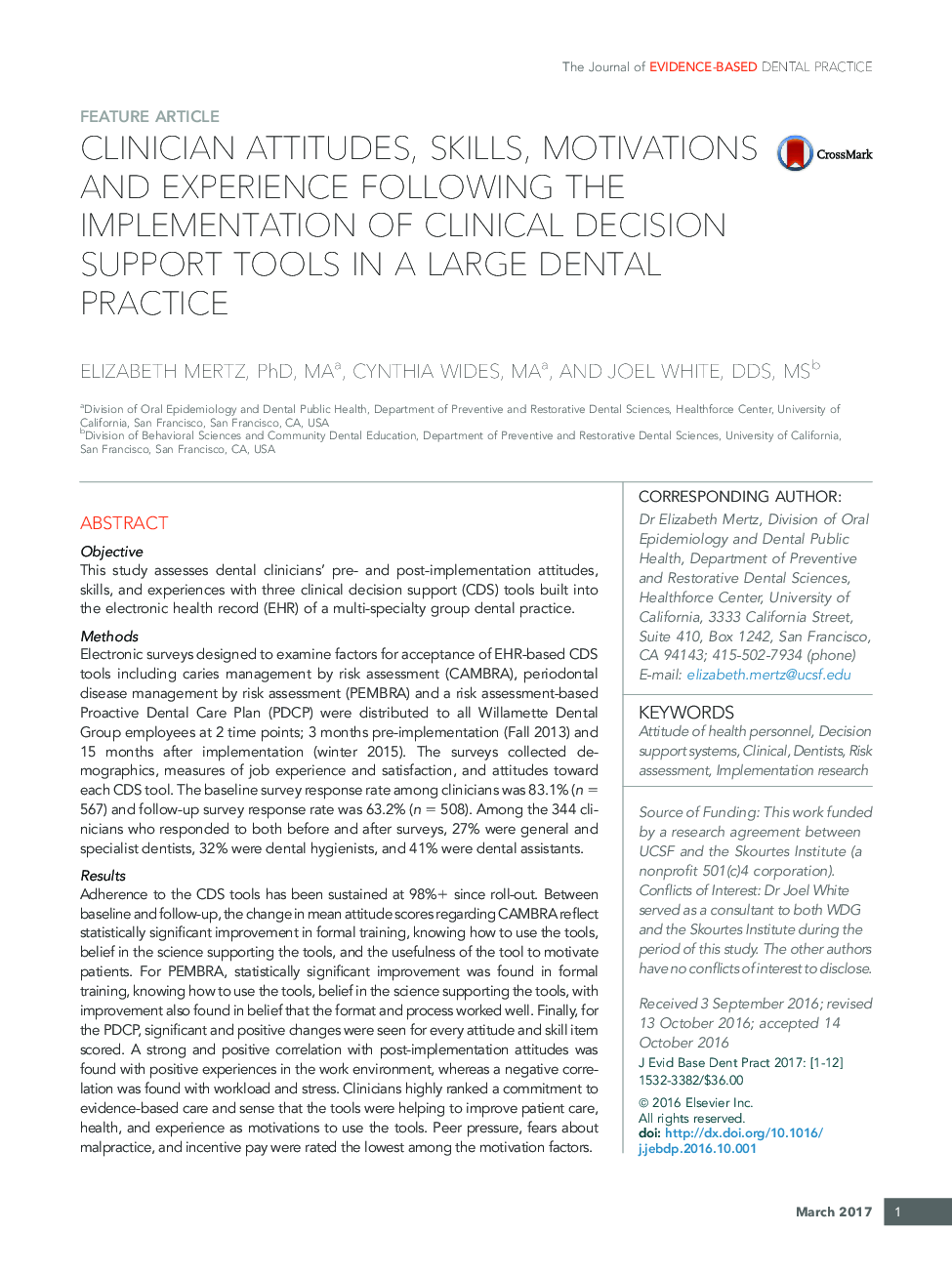| کد مقاله | کد نشریه | سال انتشار | مقاله انگلیسی | نسخه تمام متن |
|---|---|---|---|---|
| 5641269 | 1406851 | 2017 | 12 صفحه PDF | دانلود رایگان |
- Examined provider attitudes toward clinical decision support tools both before and after implementation and measured change over time.
- Developed domain variables from multiple measures of attitude and skill both before and after implementation.
- Positive work environment factors correlated with positive attitudes and skill at baseline and improved at follow-up.
- Stress and burnout correlated with negative attitudes and skill at baseline and follow-up.
ObjectiveThis study assesses dental clinicians' pre- and post-implementation attitudes, skills, and experiences with three clinical decision support (CDS) tools built into the electronic health record (EHR) of a multi-specialty group dental practice.MethodsElectronic surveys designed to examine factors for acceptance of EHR-based CDS tools including caries management by risk assessment (CAMBRA), periodontal disease management by risk assessment (PEMBRA) and a risk assessment-based Proactive Dental Care Plan (PDCP) were distributed to all Willamette Dental Group employees at 2 time points; 3 months pre-implementation (Fall 2013) and 15 months after implementation (winter 2015). The surveys collected demographics, measures of job experience and satisfaction, and attitudes toward each CDS tool. The baseline survey response rate among clinicians was 83.1% (n = 567) and follow-up survey response rate was 63.2% (n = 508). Among the 344 clinicians who responded to both before and after surveys, 27% were general and specialist dentists, 32% were dental hygienists, and 41% were dental assistants.ResultsAdherence to the CDS tools has been sustained at 98%+ since roll-out. Between baseline and follow-up, the change in mean attitude scores regarding CAMBRA reflect statistically significant improvement in formal training, knowing how to use the tools, belief in the science supporting the tools, and the usefulness of the tool to motivate patients. For PEMBRA, statistically significant improvement was found in formal training, knowing how to use the tools, belief in the science supporting the tools, with improvement also found in belief that the format and process worked well. Finally, for the PDCP, significant and positive changes were seen for every attitude and skill item scored. A strong and positive correlation with post-implementation attitudes was found with positive experiences in the work environment, whereas a negative correlation was found with workload and stress. Clinicians highly ranked a commitment to evidence-based care and sense that the tools were helping to improve patient care, health, and experience as motivations to use the tools. Peer pressure, fears about malpractice, and incentive pay were rated the lowest among the motivation factors.ConclusionThis study shows that CDS tools built into the EHR can be successfully implemented in a dental practice and widely accepted by the entire clinical team. Achieving a high level of adherence to use of CDS can be done through adequate training, alignment with the mission and purpose of the organization, and is compatible with an improved work environment and clinician satisfaction.
Journal: Journal of Evidence Based Dental Practice - Volume 17, Issue 1, March 2017, Pages 1-12
